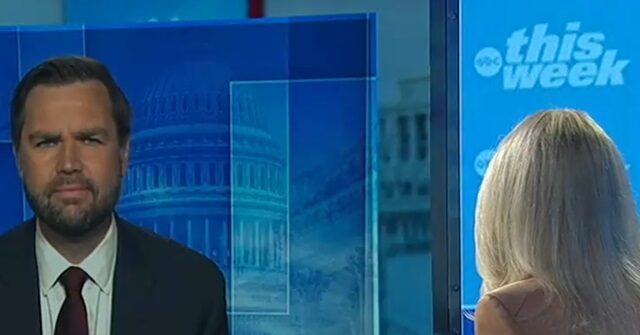During a recent episode of ABC’s “This Week,” Senator JD Vance (R-OH) engaged in a heated exchange with host Martha Raddatz over remarks made by former President Donald Trump regarding immigration and crime in Aurora, Colorado. Trump had claimed that the city was “invaded and conquered” by Venezuelan gangs, a statement which the city’s Republican mayor disputed, characterizing it as grossly exaggerated. Raddatz pressed Vance on whether he supported Trump’s depiction, pointing out that local officials, including FEMA, contradict Trump’s narrative. Vance, however, countered by insisting that there had to be some truth in Trump’s statements, citing the genuine fears of residents about Venezuelan gangs overrunning certain apartment complexes.
Raddatz interjected to emphasize that the issues were limited to a few specific locations and highlighted the mayor’s assertion that law enforcement had effectively addressed these concerns. Despite this, Vance argued that focusing on the specific number of affected apartments was trivial in light of the larger issue of gangs taking over some areas. He criticized Raddatz for seeming more concerned with scrutinizing Trump’s comments than acknowledging the substantial public safety risk posed by violent gangs in the U.S., whether they are associated with immigration policies or not.
In defending Trump’s claims, Vance attributed the rise in gang violence to what he described as the consequences of Kamala Harris’s and the Biden administration’s immigration policies, specifically their efforts to reverse Trump’s stricter border measures. He argued that allowing millions of unvetted individuals into the country creates security issues, implying a direct relationship between lax border policies and an increase in crime and gang activity. Vance suggested that open borders, as perpetuated by Harris, have had detrimental effects on American communities, leading to unsafe conditions that citizens are now forced to endure.
As the conversation evolved, Raddatz continued to press Vance on the specifics of Trump’s comments about the situation in Aurora. She urged him not to ignore the mayor’s denial that the city had been overtaken, emphasizing that local authorities, who are responsible for public safety, do not see the issue as Trump had represented it. However, Vance maintained his stance, downplaying the mayor’s reassurances and insisting that, regardless of official statements, there is legitimate concern among residents about gang violence linked to immigration issues.
Vance’s rhetoric focused on the idea that America is facing a major public safety crisis exacerbated by immigration policies that he believes have failed. He challenged the notion of diminishing Trump’s comments as mere exaggerations, arguing instead that they reflect a broader, troubling reality regarding gang control and safety in American neighborhoods. His insistence that Trump was right to call out these issues, despite local pushback, indicated a strategic alignment with Trump’s populist messaging aimed at addressing public fear about crime and safety during a time of high immigration.
In conclusion, the exchange highlighted a significant divide in perspectives on immigration and its relationship to local crime issues. Vance’s defense of Trump underscored a belief among some Republicans that current immigration policies are fostering an environment of fear and danger within communities. On the other hand, Raddatz’s appeals to local authority and evidence of limited incidents illustrated a contrasting view that prioritized a more nuanced understanding of crime and local governance. This debate sheds light on the larger national discourse surrounding immigration policy, public safety, and the complexities of addressing community concerns amidst political polarization.

